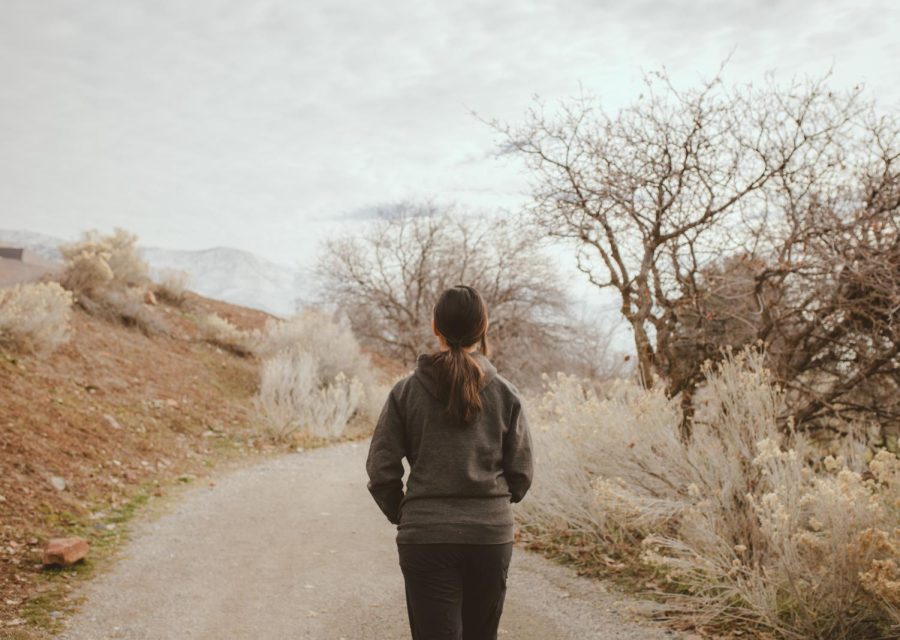Buening: Value Your Leisure Time
Isabella Dávalos taking a walk by Red Butte Garden in Salt Lake City on Jan. 15, 2022 (Photo by Emily Rincon | The Daily Utah Chronicle)
January 15, 2022
I love traveling, especially because I can immerse myself in different lifestyles and broaden my perspectives. I recently visited family in Barcelona, Spain. After my trip, I felt disappointed to return to the hustle and bustle of normal life. Everyone usually feels that way after a vacation, but my feelings went beyond dreading schoolwork. The cultural differences I experienced abroad made me question some of America’s more troubling normalcies. Specifically, I didn’t miss our unforgiving work culture that demands a constantly busy schedule.
Too often, we attach our self-worth to the number of hours we work. We all fall victim to unhealthy work behaviors, whether it’s taking on an unmanageable number of credit hours or giving ourselves no leniency. While we should work hard to pursue our ambitions, we have to stop sacrificing our mental health in the process. To achieve greater wellbeing and overall productivity, we should learn to better value our leisure time.
Americans have become some of the most stressed people in the world. What else would we expect when we deny workers vacation time, work insidiously long hours and spend more and more of our time indoors?
Even when Americans have leisure time, we often don’t participate in beneficial activities. Studies have shown that for leisure time to yield the best benefits, people must become mentally engaged by the activity. But instead of engaging in activities like relaxing and thinking, socializing or participating in sports, Americans favor watching TV.
The issue extends to our transportation systems, as well. We spend some of the least amount of time utilizing public transportation or walking. In the United States, approximately 45% of people have no access to public transportation at all. According to Dr. David R. Bassett, Jr., a person can typically be considered sedentary if they take less than 5,000 steps per day. On average, Americans take 4,774.
While every county has its problems, we can learn a great deal from other countries that do better than us in some areas. Upon arriving in Barcelona, I noticed key differences in their daily life. For one, I saw people utilizing public transportation much more than I’ve seen in the U.S. Europe’s public transportation systems remain more effective than ours, partially due to their city layouts. Because much of European infrastructure got developed before the automotive age, their cities promote transit-friendliness. People living in countries like Switzerland walk almost double the steps of the average American.
It makes sense that our infrastructure would influence our cultural preferences, but we’re not promoting healthy habits. By utilizing public transportation and walking more, other cultures gain more from their time spent in transit. Taking public transportation fulfills part of our innate needs to get out around people, but it also increases our amount of physical activity, which we definitely need more of.
The little things go a long way, too. I noticed that people spent considerably more time outside. The majority of apartments, even the smallest ones, included outdoor backyard or patio areas. Having access to outdoor spaces also significantly improves mental health. Mealtimes are also notably longer in Barcelona, where people can spend hours talking over savored food. The restaurants I saw usually included outdoor seating areas to promote these interactions.
One valuable way to spend leisure time is simply going on vacation. My brief excursion made me happier than I was during fall semester. So why do we settle for this depressing reality? The U.S. is the only country in the Organization for Economics Co-operation and Development (OECD) that doesn’t mandate paid vacation time. Even when we have vacation time available to us, our toxic work standards prevent us from using them. American employees only take about 73% of their little allotted vacation time.
It might sound scary to move away from the work culture we’ve become so accustomed to. We’re taught that success comes from spending longer, more arduous hours at work than our peers. Ironically, research has proven that enjoying more quality leisure can improve productivity.
In one BYU study, researchers discovered that by taking even a 45-minute recreation break, a working team experienced 20% more productivity. European countries, where people utilize nearly all of their vacation time, made up nine of the top 10 most productive countries in the OECD in 2015.
After leading a similar study on the topic, Professor Matthew Zawadzki from the University of California, Merced said, “When people engage in leisure activity, they have lower stress levels, better mood, a lower heart rate and more psychological engagement — that means less boredom, which can help avoid unhealthy behaviors.” We should strive for this healthier lifestyle.
It starts small, with our individual decisions to go outside more, grant ourselves more leniency and do more things that make us happy. But eventually, we need to tackle the larger issue of our infrastructure, which promotes skewed priorities and lack of vacation time.
As important as it is to apply ourselves and pursue our goals, taking time to enjoy and experience life shouldn’t determine our value. Your value is in your existence, not in your ability to increase GDP. We need to prioritize time spent doing things we enjoy, especially in the wake of COVID-19’s mental health impacts. You deserve the time to slow down amidst a fast-paced world. It will do more good for you and your work than the alternative.









